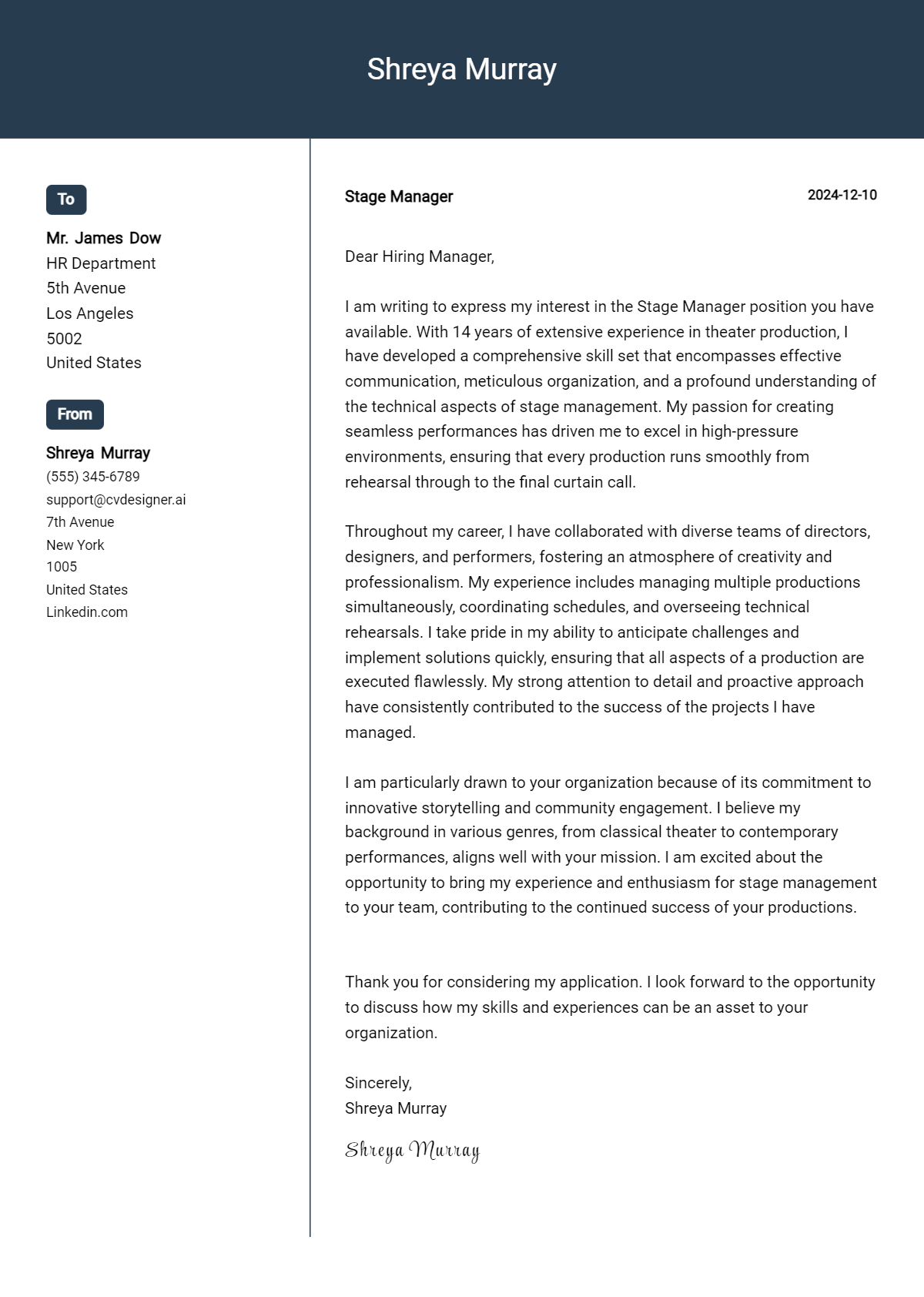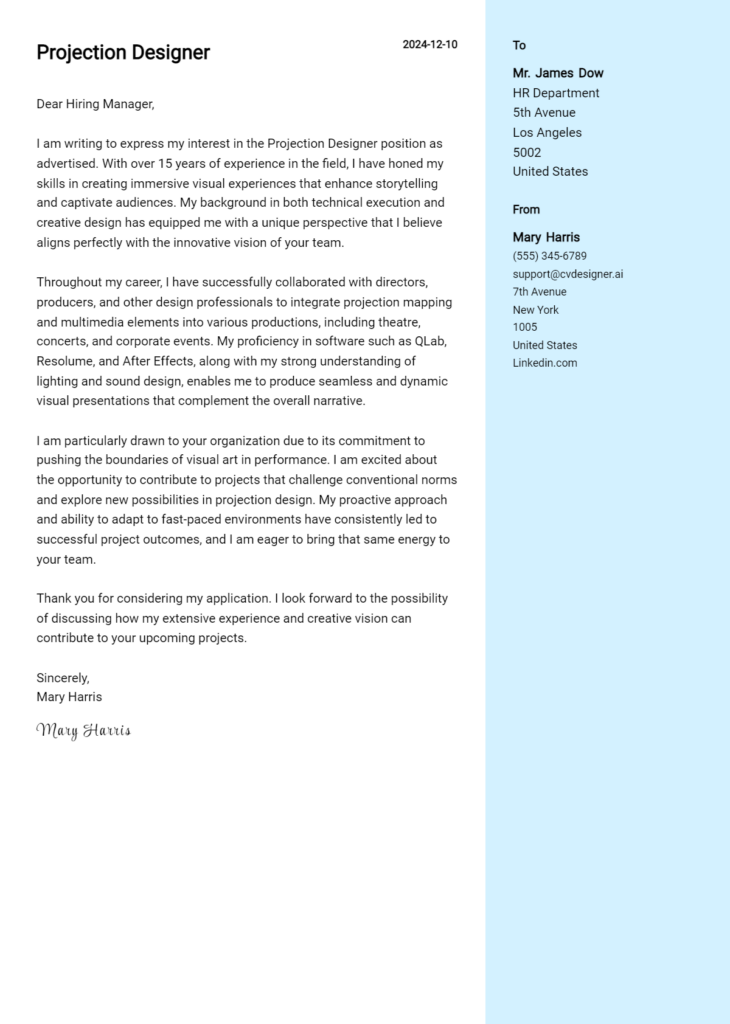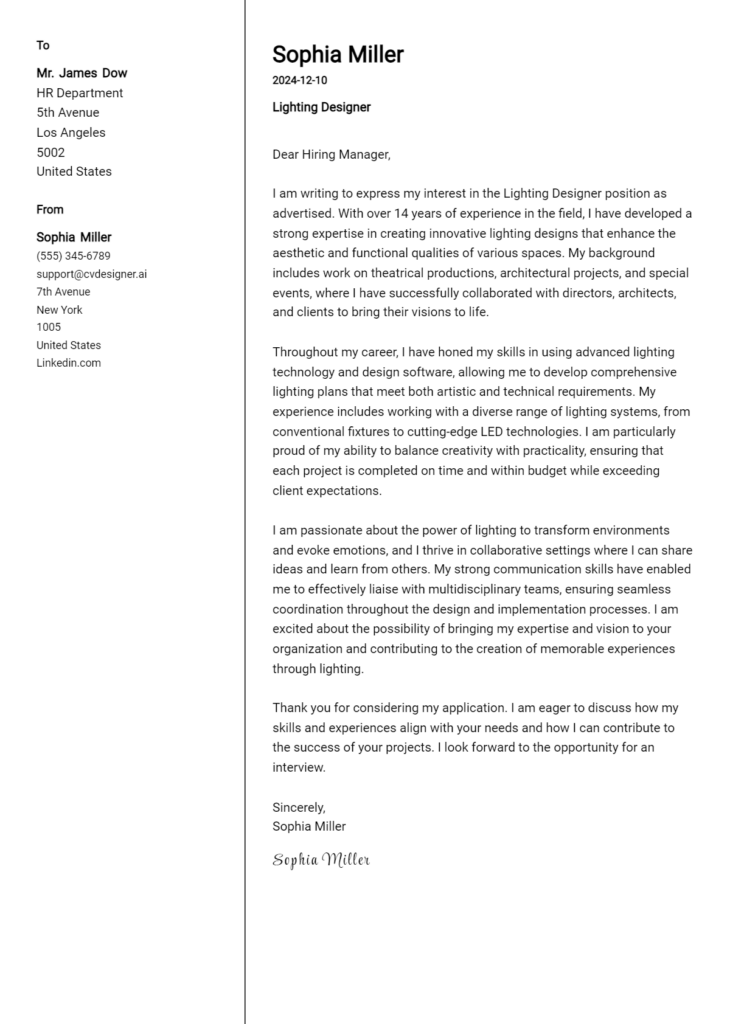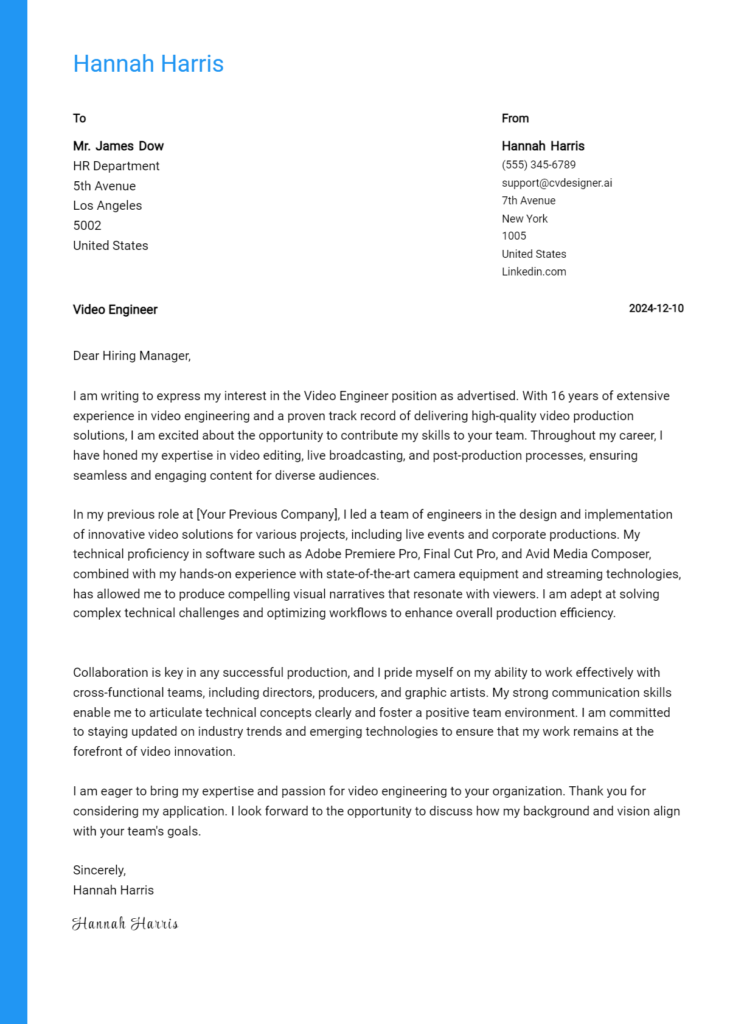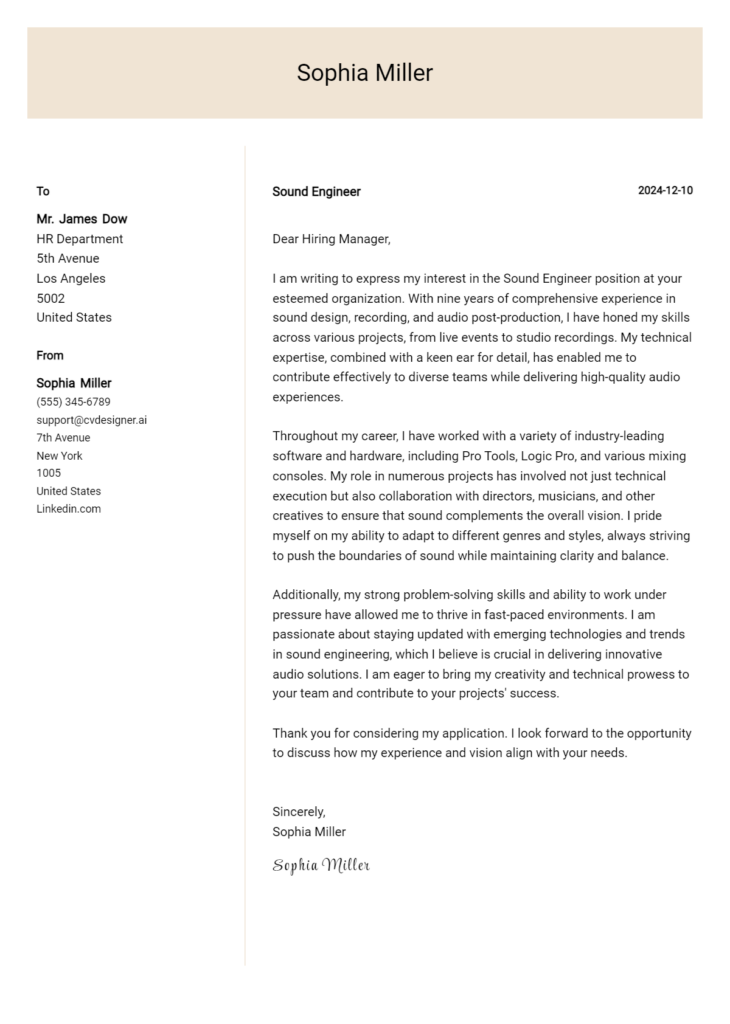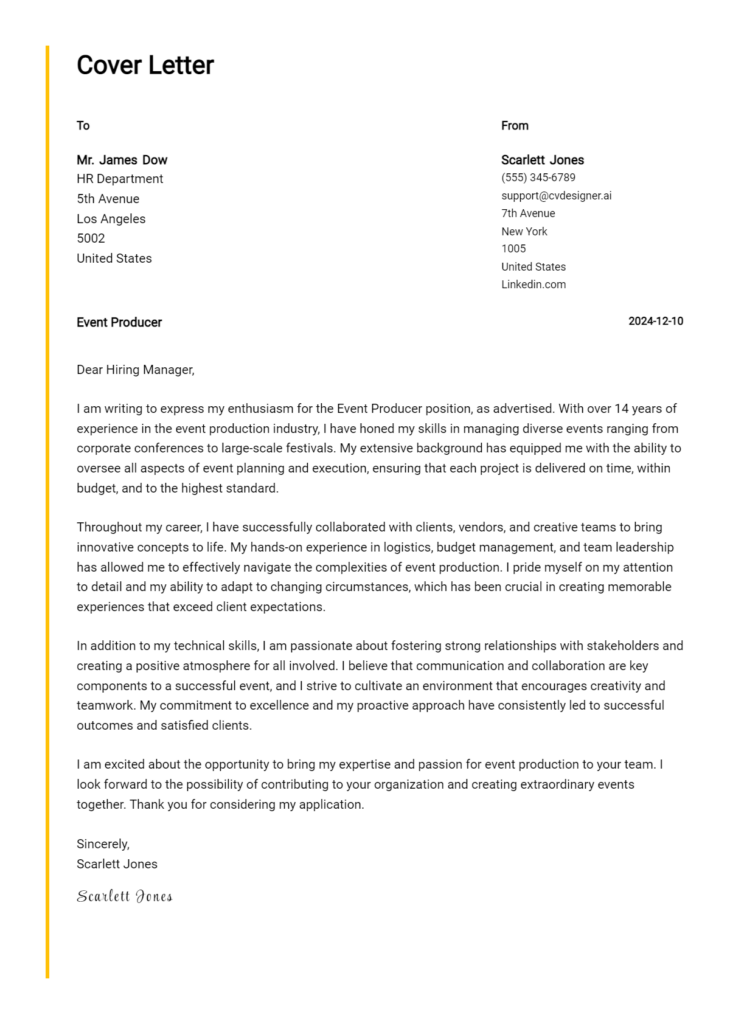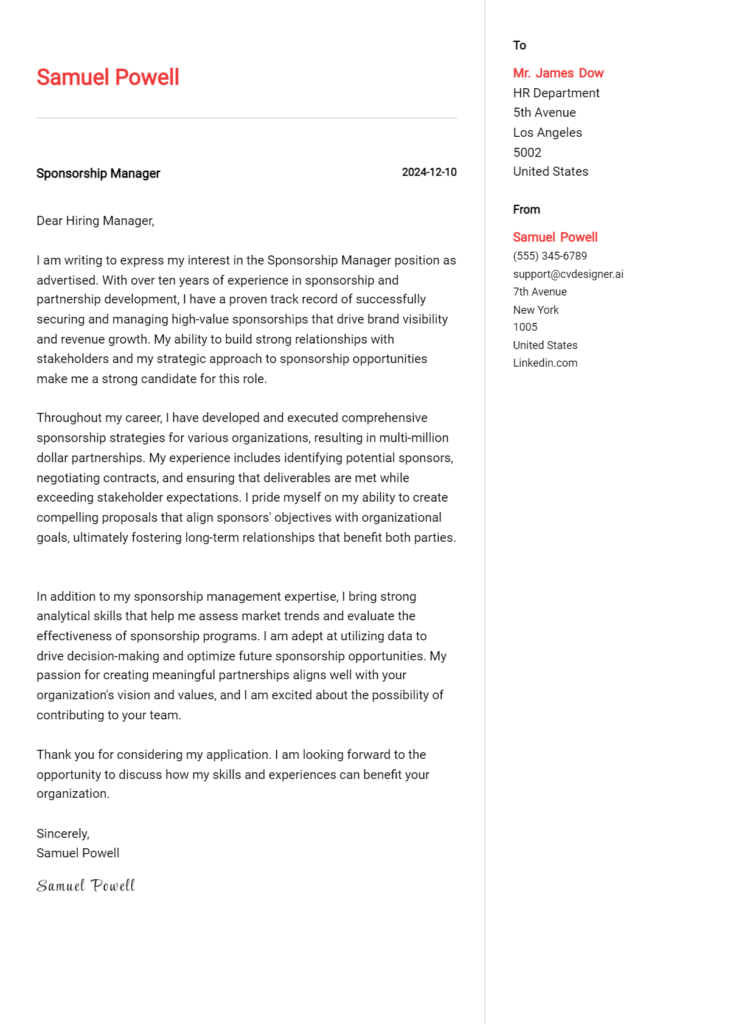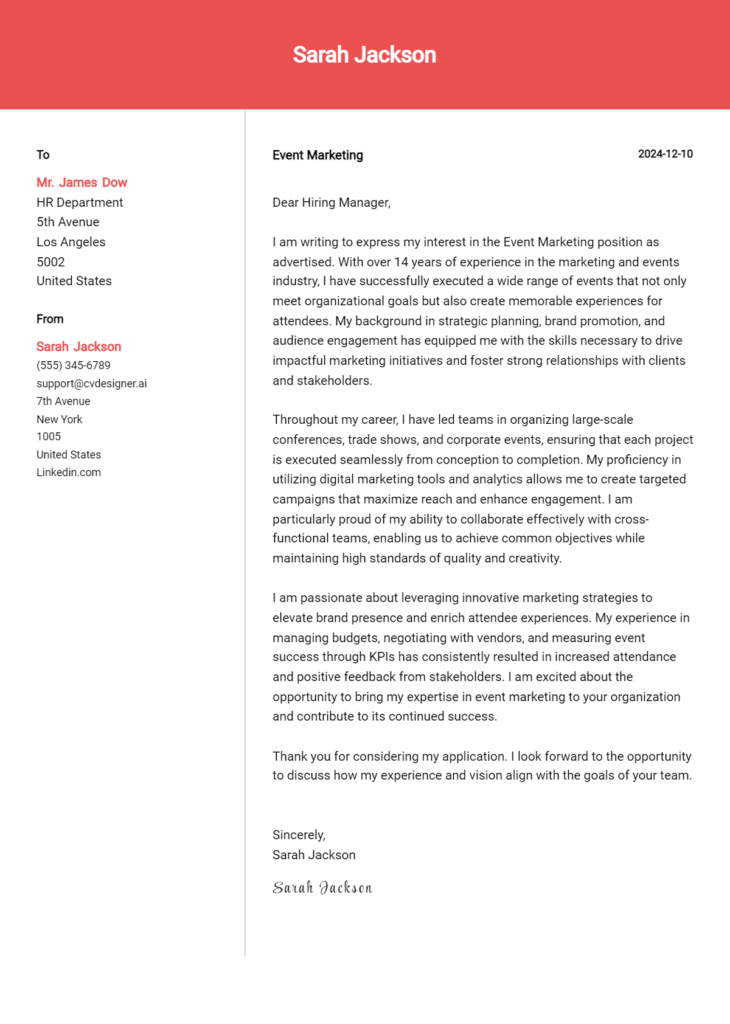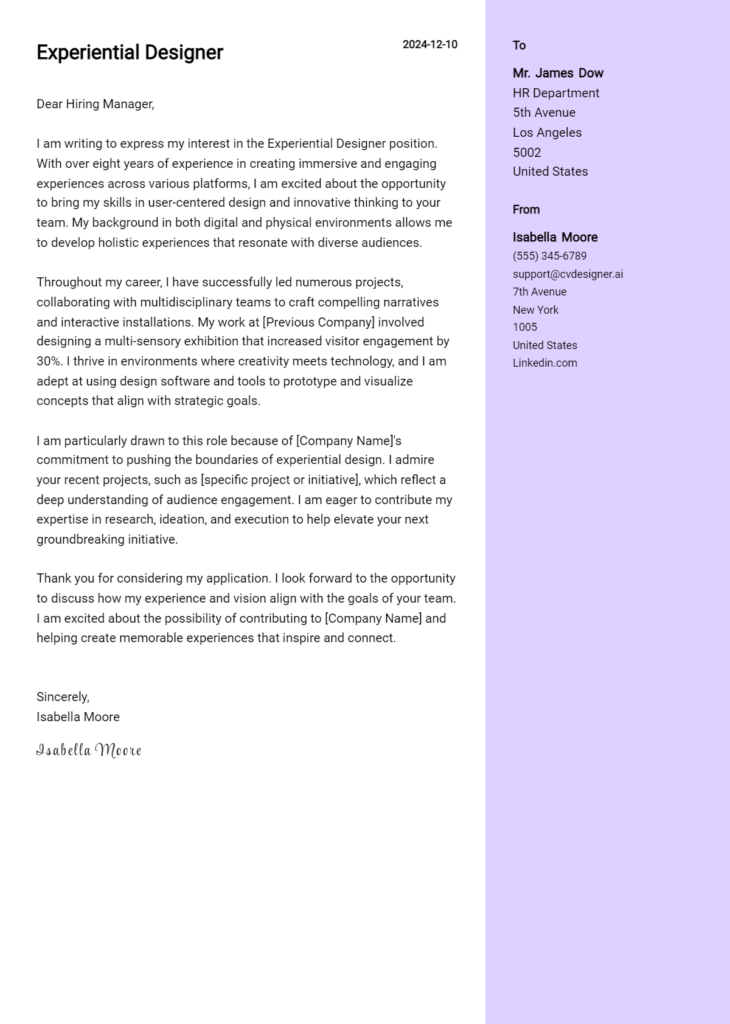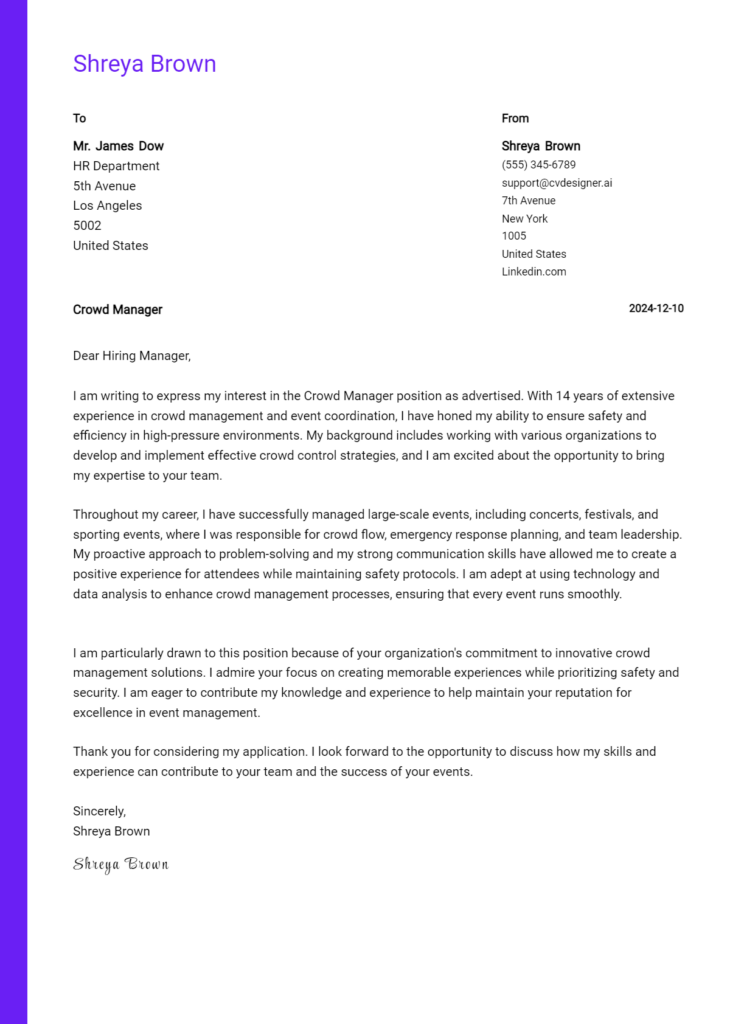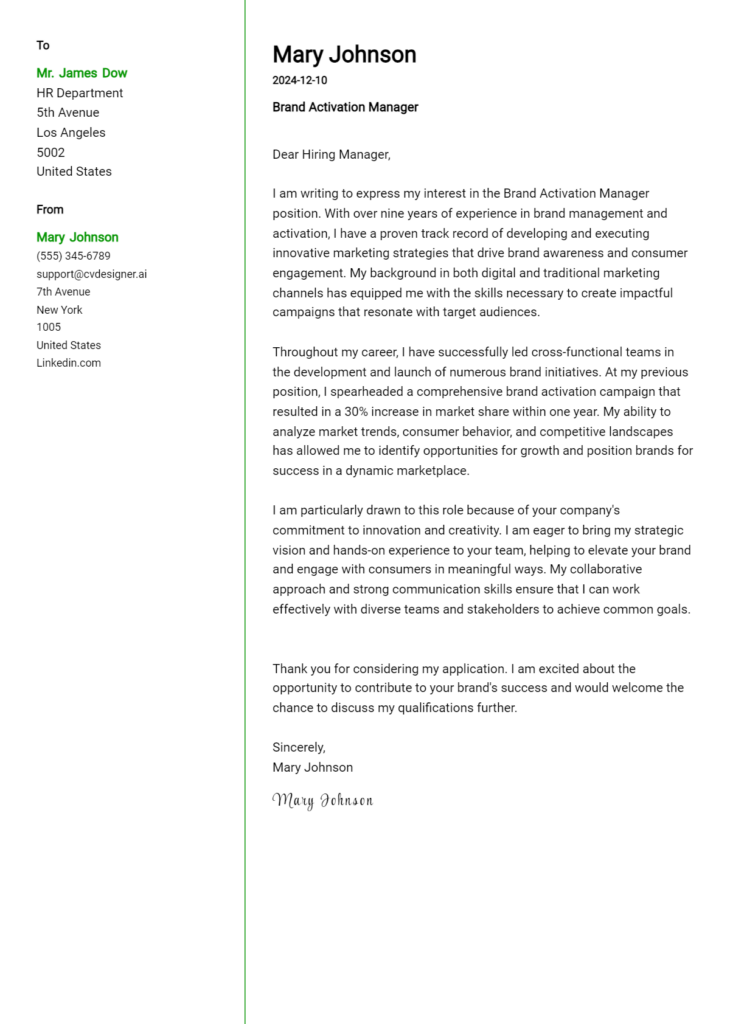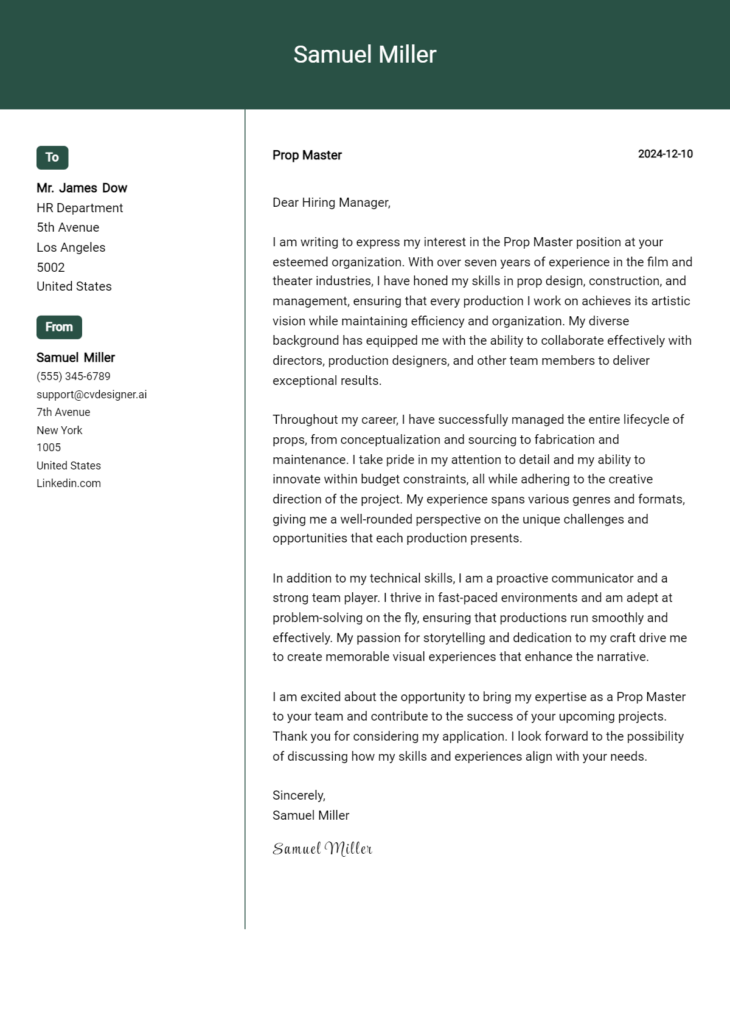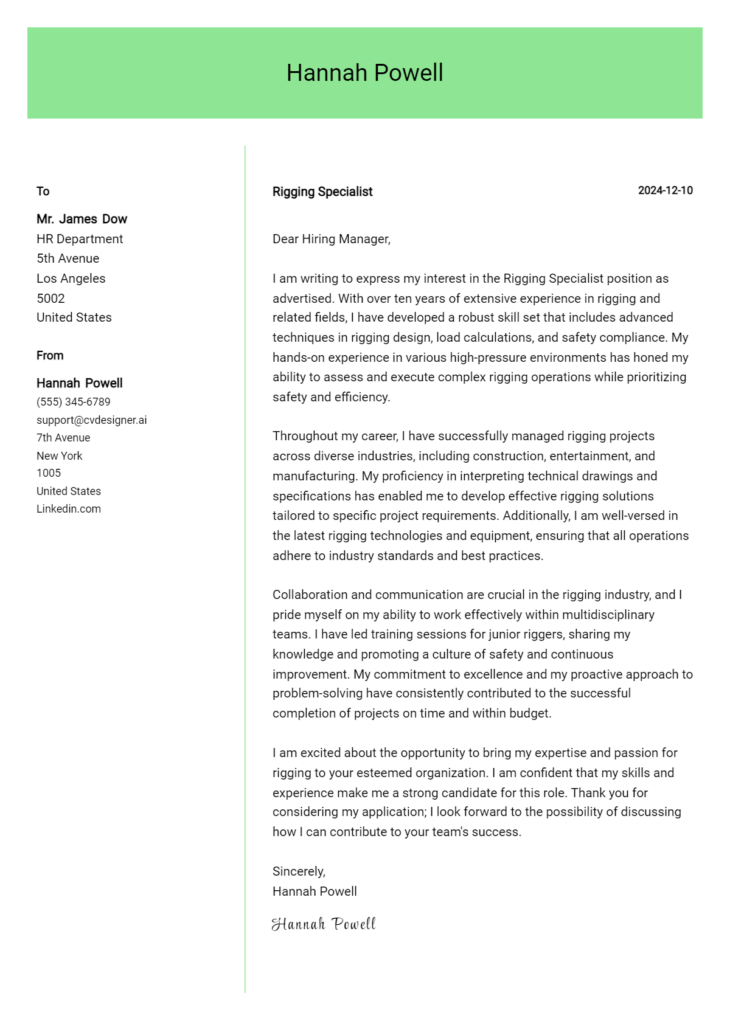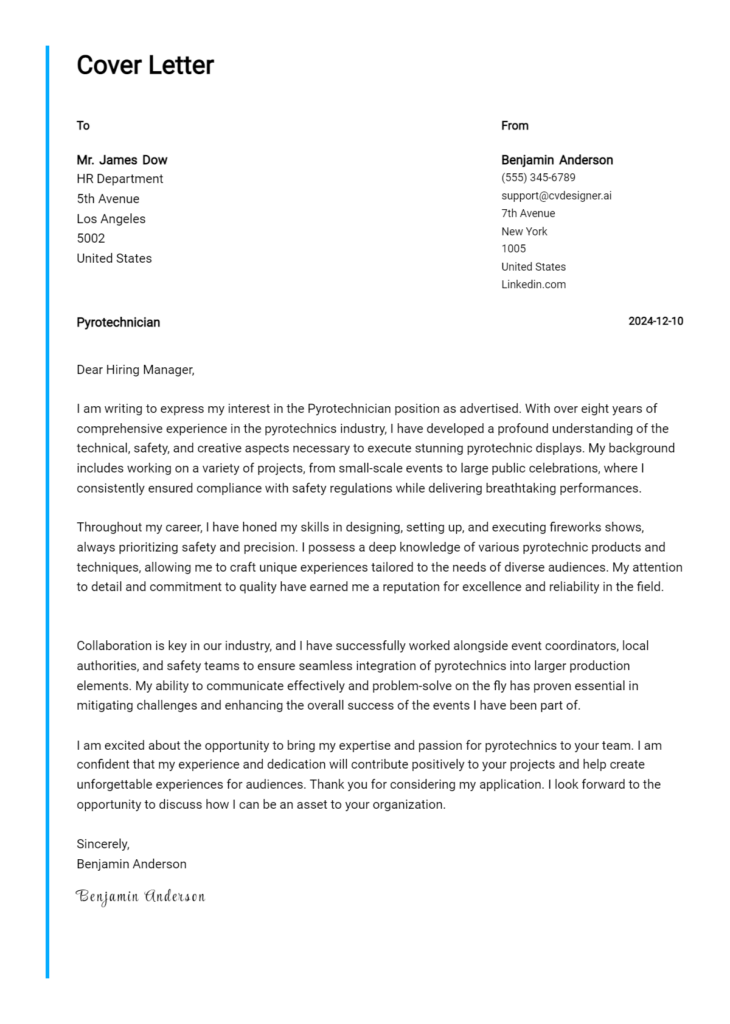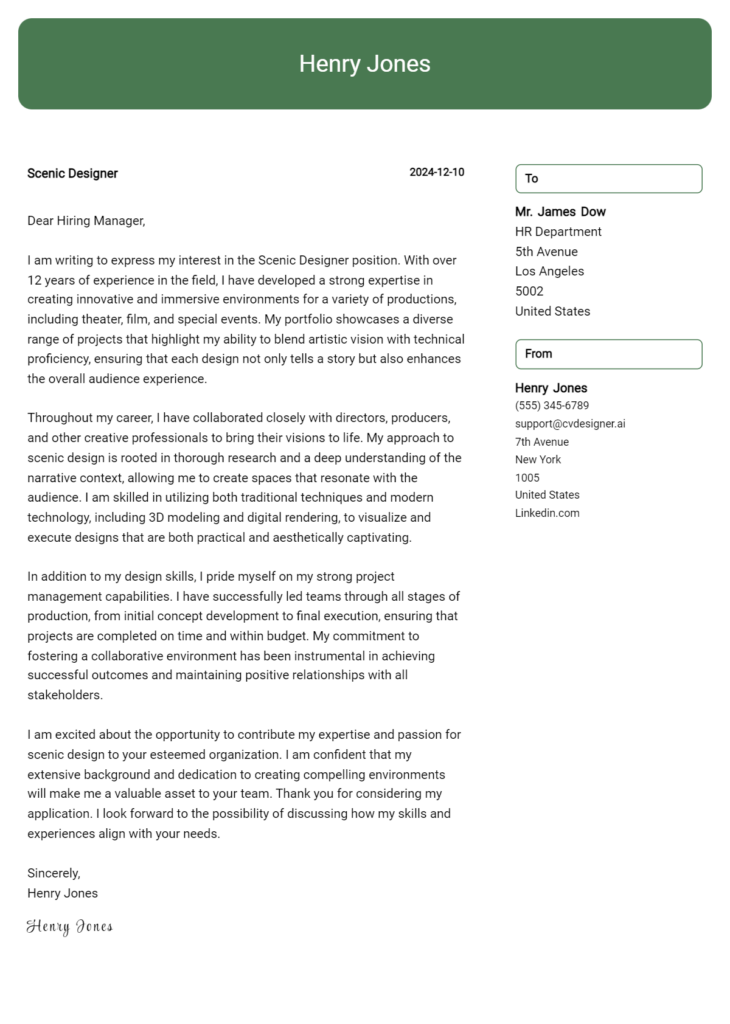Stage Manager Cover Letter Examples
Explore additional Stage Manager cover letter samples and guides and see what works for your level of experience or role.
How to Format a Stage Manager Cover Letter?
Crafting a compelling cover letter is essential for a Stage Manager, as it serves as your first opportunity to demonstrate your organizational skills and attention to detail. The way you format your cover letter not only reflects your professionalism but also reveals your ability to manage complex productions. A well-structured cover letter captures the hiring manager's attention and showcases your unique qualifications—critical attributes in the fast-paced world of stage management.
In this guide, we will explore how to effectively structure your cover letter, providing insights and examples tailored for the stage management field.
We will focus on the essential components of a professional cover letter, including:
- Cover Letter Header
- Cover Letter Greeting
- Cover Letter Introduction
- Cover Letter Body
- Cover Letter Closing
Each section is crucial in highlighting your qualifications and commitment to excellence. Let’s break down each part to help your stage manager cover letter shine.
Importance of the Cover Letter Header for a Stage Manager
The cover letter header is a critical component of your application as a Stage Manager, as it sets the tone for your professionalism and attention to detail. A well-structured header should include your contact information, the date, and the recipient's details to ensure clarity and facilitate communication. It not only helps the hiring manager identify your application quickly but also reflects your organizational skills, which are crucial in stage management. A clear and professional header can make a strong first impression, while a poorly formatted one might raise doubts about your suitability for the role.
Strong Example:
Jane Doe 123 Stage Road Theatre City, ST 12345 (123) 456-7890 jane.doe@email.com October 12, 2023 Mr. John Smith Artistic Director Theatre Company 456 Performance Ave Arts Town, ST 67890
Weak Example:
jane doe 123 stage Rd, Theatre city 123-456-7890 10/12/2023 theatre company
The Importance of a Cover Letter Greeting for a Stage Manager
The greeting of your cover letter is crucial as it sets the tone for the entire document. A well-crafted greeting not only demonstrates professionalism but also shows a level of personalization that can make your application stand out. Addressing the hiring manager directly conveys your genuine interest in the position and establishes a connection before diving into your qualifications. To avoid sounding generic, take the time to research the recipient's name; this small effort can significantly enhance the impact of your letter. Instead of using a one-size-fits-all greeting, aim for a personalized approach that reflects your dedication to the role.
Strong Greeting Example
Dear Ms. Johnson, I am writing to express my enthusiasm for the Stage Manager position at the Grand Theatre, as advertised on your website.
Weak Greeting Example
To Whom It May Concern, I would like to apply for the Stage Manager position.
The Importance of a Compelling Cover Letter Introduction for a Stage Manager
A well-crafted cover letter introduction is crucial for a Stage Manager as it serves as the first impression to potential employers. This opening paragraph should not only capture the hiring manager's attention but also clearly express the candidate’s enthusiasm for the role. Additionally, it is an opportunity to briefly showcase key skills or notable achievements that set the candidate apart from others. An effective introduction can make all the difference in the competitive field of stage management, demonstrating both professionalism and passion for the craft. Below are examples of strong and weak cover letter introductions for a Stage Manager position.
Strong Example
Dear [Hiring Manager's Name], As a dedicated Stage Manager with over five years of experience leading successful productions in both theater and live events, I am excited to apply for the Stage Manager position at [Company Name]. My proven ability to coordinate complex schedules, manage diverse teams, and maintain a calm demeanor under pressure has resulted in seamless performances and satisfied clients. I am particularly drawn to your commitment to innovative storytelling and would be thrilled to contribute my skills to your upcoming season.
Weak Example
Hello, I want to apply for the Stage Manager job. I think I can do it because I have some experience in theater. I have worked on a few shows, and I like being in charge. I hope you will consider my application.
Purpose of the Cover Letter Body for a Stage Manager
The body of a cover letter for a Stage Manager serves as a critical platform for candidates to articulate their relevant skills, experiences, and the unique value they can bring to the production team. This section should effectively highlight specific projects or accomplishments that demonstrate the candidate's capability to manage stage operations, coordinate with various departments, and ensure a seamless performance. By emphasizing successful past experiences, such as managing complex productions or implementing innovative solutions to challenges, the candidate can create a compelling narrative that showcases their proficiency and dedication to the craft of stage management.
Strong Example
Dear [Hiring Manager's Name], I am excited to apply for the Stage Manager position at [Company Name]. With over five years of experience in theater production, I have successfully managed various high-profile projects, including the award-winning musical "Harmony" at the Grand Theater, where I coordinated a cast of over 30 performers and a crew of 15 technical staff. My ability to maintain a calm and organized atmosphere during rehearsals was pivotal in meeting tight deadlines and ensuring a flawless opening night. Additionally, I implemented a new scheduling system that improved communication between the cast and crew, reducing conflicts by 30%. I am eager to bring my passion for stage management and proven track record of success to your esteemed company. Sincerely, [Your Name]
Weak Example
To Whom It May Concern, I am applying for the Stage Manager job. I have done some stage management in the past. I worked on a few shows, but I can't remember the details. I think I am a good fit because I like theater. I am hoping to get a chance to work with your team. Best, [Your Name]
Importance of the Cover Letter Closing for a Stage Manager
The closing of a cover letter for a Stage Manager is crucial as it serves to reinforce the applicant's qualifications, express enthusiasm for the position, and prompt the employer to take the next steps. A strong closing effectively summarizes the candidate's relevant experiences and skills, reiterates their passion for the role, and encourages the hiring manager to review their resume or schedule an interview. Conversely, a weak closing may leave the reader unmotivated or unclear about the candidate’s interest or qualifications.
Strong Example
In closing, I am excited about the opportunity to bring my extensive stage management experience and passion for theatrical productions to your team. My proven track record in coordinating complex performances and my ability to adapt to the fast-paced nature of live events make me a perfect fit for this position. I look forward to the possibility of discussing how my skills can contribute to the success of your upcoming productions. Thank you for considering my application; I hope to hear from you soon to schedule an interview.
Weak Example
Thanks for reading my letter. I have some experience in stage management, and I think it would be cool to work with your team. I attached my resume, so you can look at it if you want. Let me know if you need anything else.
Crafting an effective cover letter for a Stage Manager position is essential to stand out in a competitive field. A well-written cover letter not only highlights your relevant technical skills and problem-solving abilities but also demonstrates your knowledge of the Software Development Life Cycle (SDLC), your ability to work collaboratively in a team, and your passion for continuous learning. Here are some tips to help you create a compelling cover letter that showcases your qualifications and enthusiasm for the role.
Tips for Writing a Stage Manager Cover Letter
Highlight Your Technical Skills
Begin by detailing your technical expertise relevant to stage management. Mention specific software or tools you are proficient in, such as scheduling software, lighting control systems, or audio engineering tools. Providing concrete examples of how you’ve used these skills effectively in past productions can make your cover letter more impactful.Demonstrate Problem-Solving Abilities
Stage management often involves quick thinking and problem resolution under pressure. Include examples of challenges you faced during a production and how you overcame them. This could involve managing last-minute changes, resolving conflicts among team members, or ensuring that the show goes on despite unforeseen circumstances.Showcase Your Knowledge of the SDLC
If applicable, discuss your understanding of the Software Development Life Cycle as it relates to stage management. This could include planning, execution, and monitoring of productions. Articulate how your knowledge contributes to the overall success of a project, emphasizing your ability to manage timelines and deliver results.Emphasize Teamwork and Collaboration
A Stage Manager is often the linchpin of a production team. Highlight your experience working collaboratively with directors, actors, and technical crews. Share specific instances where your role was pivotal in fostering communication and collaboration among team members, ensuring a smooth production process.Express a Passion for Continuous Learning
The performing arts are ever-evolving, and a strong candidate should demonstrate a commitment to ongoing education and skill enhancement. Mention any workshops, certifications, or courses you’ve taken that are relevant to stage management. This shows potential employers that you are proactive about personal and professional development.
By incorporating these tips into your cover letter, you can effectively convey your readiness for a Stage Manager role. For additional guidance, you may want to explore cover letter templates or utilize a cover letter builder to streamline the writing process and ensure your letter stands out.
Common Mistakes to Avoid in a Stage Manager Cover Letter
Crafting a compelling cover letter is essential for any stage manager seeking to secure a position in the competitive world of theater. Avoiding common mistakes can significantly enhance your chances of making a positive impression. Here are some frequent pitfalls and tips to steer clear of them:
Generic Greetings: Using "To Whom It May Concern" can make your letter seem impersonal. Instead, research the hiring manager's name for a personalized touch.
Lack of Specificity: Failing to mention specific skills or experiences related to stage management can weaken your application. Highlight relevant projects, techniques, or tools you have used in past roles.
Too Lengthy: A cover letter should be concise, ideally one page. Avoid rambling; stick to the most relevant experiences and skills. For guidance on structure, refer to this cover letter format.
Neglecting Passion: Not expressing your enthusiasm for the role can make your letter fall flat. Convey your passion for stage management and the particular production or company you’re applying to.
Grammar and Spelling Errors: Typos can undermine your professionalism. Always proofread your letter and consider having someone else review it.
Vague Language: Avoid ambiguous terms; be specific about your accomplishments. Instead of saying “I managed a production,” specify “I successfully managed a 10-person crew for a 3-week production of 'Hamlet.'”
Ignoring the Job Description: Tailoring your cover letter to the job description is crucial. Identify key responsibilities and skills mentioned and address them directly in your letter.
By steering clear of these common mistakes, you can create a strong, tailored cover letter that stands out. For inspiration, check out these cover letter examples to see how others have successfully framed their applications.
Cover Letter FAQs for Stage Manager
What should I include in my cover letter as a Stage Manager?
In your cover letter, focus on your relevant experience, skills, and passion for theater. Start with a strong introduction that captures your enthusiasm for the role. Highlight specific projects you’ve managed, detailing your responsibilities and achievements. Include your skills in organization, communication, and problem-solving, as these are crucial for a Stage Manager. Mention any technical expertise, such as knowledge of lighting, sound, or stage design. Finally, tailor your cover letter to the specific production or company, demonstrating your understanding of their artistic vision and how you can contribute to it.
How can I make my cover letter stand out?
To make your cover letter stand out, personalize it for each application. Research the production company and reference their past works or current projects that resonate with you. Use engaging language that reflects your passion for theater. Incorporate anecdotes or specific examples that showcase your problem-solving skills and ability to handle high-pressure situations. A well-structured letter that conveys your personality, along with your professional qualifications, can leave a memorable impression on hiring managers.
Should I include my education in my cover letter?
Yes, you should include your education in your cover letter, especially if you have relevant degrees or certifications related to theater or stage management. Briefly mention your degree, the institution, and any specialized training that pertains to the role. If you participated in significant productions or internships during your studies, highlight those experiences to demonstrate your practical knowledge. However, keep this section concise and focus more on your hands-on experience and skills, as these are often more impactful in the performing arts industry.
How long should my cover letter be?
Your cover letter should ideally be one page in length, which allows you to provide enough detail without overwhelming the reader. Aim for three to four well-structured paragraphs that cover your introduction, relevant experience, specific skills, and a strong closing statement. Use concise language and avoid lengthy descriptions. Remember, hiring managers often review many applications, so clarity and brevity are key to making a lasting impression. A focused cover letter that gets to the point while showcasing your enthusiasm will be more effective than a lengthy one.
Build your Cover Letter in minutes
Use an AI-powered cover letter builder and have your letter done in 5 minutes. Just select your template and our software will guide you through the process.

